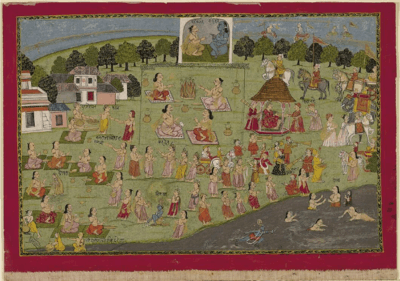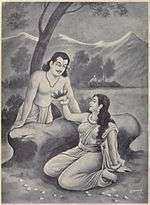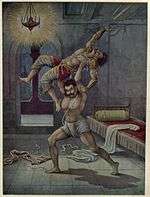Bhima
| Bhima | |
|---|---|
|
Mahabharata | |
 Bhimasen | |
| Information | |
| Spouse(s) |
Hidimbi, Draupadi |
| Children |
Ghatotkacha |
In the Hindu epic Mahabharata, Bhima (Sanskrit: भीम) is the second of the Pandavas. The Mahabharata relates many events which portray the immense might of Bhima. Bhima is responsible for slaying all hundred Kaurava brothers in the Kurukshetra War.
Etymology
The word bhima in Sanskrit means 'terrible' or 'formidable'. His other names are-
- Bhimasena (भीमसेन) - he who has a formidable army.
- Vrikodara (वृकोदर) - wolf bellied or voracious eater.
Birth and early years
Because of a curse from the Rishi Kindama, Pandu and his wives are unable to conceive naturally. Hence, the Pandavas were conceived in an unusual way. His wife, Queen Kunti, had in her youth been granted the power to invoke the Devas by Rishi Durvasa. Each Deva, when invoked, would bless her with a child. Urged by Pandu to use her boons, Kunti gave birth to Bhima by invoking the God of wind, Vayu.
Along with other Pandava brothers, Bhima was trained in religion, science, administration and military arts by the Kuru preceptors, Kripa and Drona. Specifically, he became a master in using the mace. Bhima's strong point throughout the epic remains his towering strength. He was so wrathful and strong that it was impossible even for Indra to subdue him in a battle.[1]
Bhima was also renowned for his giant appetite – at times, half of the total food consumed by the Pandavas was eaten by him.[2]
Trouble with Kauravas

Bhima, being as powerful as his father, was a natural bully. He used to play practical jokes on the Kaurava brothers; he used to engage in wrestling bouts where he out-powered them with consummate ease.[3][4]
His repeated failures and fecklessness against Bhima angered Duryodhana so much that he wanted him dead. He hatched a cunning plot where he poisoned Bhima's food and drowned him in River Ganga. Thankfully, the Naga king Vasuki saved Bhima and also apprised him of Duryodana's hatred for him. It is also Vasuki who bestowed him the immense strength of ten thousand elephants.[5]
Escaping fire and killing Purochana
Duryodana with his counsellor Purochana hatched a plan to burn the Pandavas alive at a lac palace lakshagraha at Varnavrata that Duryodana had built there, (lacquer is highly inflammable). Thanks to Vidura, the Pandavas managed to escape out from the palace. Bhima played a major role in carrying all five of them (Kunti and brothers) and escaping to safety. Bhima also barricaded the palace of Purochana and set fire to it, thereby ensuring Purochana became a victim of his own evil plot.[6]
Slaying Bakasura

Kunti and the Pandavas were living in agnyatavaasa (living incognito) after they escaped from the murder plot (Kunti suggests they be incognito to avoid further problems from the Kauravas). During their stay at Ekachakra or kaiwara (in Karnataka), they came to know of a demon, Bakasura, who troubled people by eating members of their village and their provisions. The powerful Bhima brought his might to the fore and trumped Bakasura, much to the delight of the villagers.[7]
Marriage and children
At the time Bhima kills the rakshasa Hidimba, he meets his sister Hidimbi; they eventually get married and have a son, Ghatotkacha. Hidimbi promises Kunti that she and Ghatotkacha will stay out of the Pandavas' lives and away from the luxuries of court.
Then the Pandavas attended the Swayamvara of Drupada princess, Draupadi. The Pandavas, led by Arjuna, were successful at the Swayamvara. With his brothers, he was married to Draupadi, who gave birth to a son, Sutasoma. At a later stage, Bhima also married Jalandhara, the daughter of the king of Kasi, and had a son named Sarvada.[8] Among Bhima's three sons, Sarvada did not participate in the Kurukshetra war, Sutasoma was killed by Ashwatthama and Ghatotkacha was killed by Karna.
Conquest for Rajasuya


When Yudhishthira became emperor of Indraprastha he sent his four younger brothers out in different directions to subjugate kingdoms for the Rajasuya sacrifice. Bhima was sent out to the East, since Bhishma thought the easterners were skilled in fighting from the backs of elephants and in fighting with bare arms, he deemed Bhima to be the most ideal person to wage wars in that region.[9] The Mahabharata mentions several kingdoms to the east of Indraprastha which were conquered by Bhima.[10] A key victory was his fights withJarasandha of the Magadha empire. This was the most important win, as Jarasandha had several allies in the region, including Shishupala and Bhagadatta. Krishna tricked Jarasandha into having a wrestling bout with Bhima. This was an agonizing battle that stretched for 13 long days. At the end, Bhima broke Jarasandha's backbone with his knee and tore apart his body into two.[11]

Exile

After Yudhishthira succumbed to Shakuni's challenge in the game of dice, the Pandavas were forced into exile for 13 years, one of which was in anonymity. The exile period in the forests, saw the Pandavas come face to face with many rakshasas and Bhima played a crucial role in the epic in rescuing his brothers.
Slaying Kirmira
Right at the start of the exile, in the woods of Kamyaka, the Pandavas encountered the demon Kirmira, the brother of Bakasura and a friend of Hidimba. A fierce battle ensued between Bhima and the demon, where the two equally matched fighters hurled rocks and trees at each other. Eventually Bhima emerged victorious.[12]
Searching for Saugandhika flower

Once in Badarikasrama forest, Draupadi scented the Saugandhika flower and was deeply attracted to it. The lotus species was not to be located easily. Bhima went in search of the flower and ended up at Kubera's palace. He was stopped in his tracks by the rakshasas called Krodhavasas, but he defeated them all and reached the lotus pond. He also slew the rakshasa Maniman a wicked demon, who had in the past, incurred a curse from Rishi Agastya by spitting on his head. Being unused to the water of the pond, Bhima fell asleep on its shore. Later the Pandavas arrived with Krishna and Draupadi in search of Bhima. They met Kubera who offered them baskets of Saugandhika lotuses and sent them on their way. Kubera was especially happy, as the slaughter of Maniman had relieved him of the curse too.[13] It was also during this search that Bhima met Hanuman (his brother, as both were Vayu's children) in the forest and sought his blessings.
Killing Jatasura
In another minor incident in the epic, Jatasura, a rakshasa disguised as a Brahmin abducted Yudhishthira, Arjuna, Draupadi and the twin brothers, Nakula and Sahadeva during their stay at Badarikasrama. His objective was to seize the weapons of the Pandavas and to ravish Draupadi. Bhima, who was gone hunting during the abduction, was deeply upset when he came to know of Jatasura's evil act on his return. A fierce encounter followed between the two gigantic warriors, where Bhima emerged victorious by decapitating Jatasura and crushing his body.[14][15]
Humiliation of Jayadratha
In another event in the Kamyaka forests, Jayadratha, a Sindhu King, abducted Draupadi when the Pandavas were away. On returning, the Pandavas learnt about this from Sage Dhaumya, followed and reached Jayadratha's army in the forest. They vanquished his army and he was nabbed by Bhima. Before Bhimasena was about to kill him, Yudhishthira told him not kill him, because he was their brother-in-law.
Cook at Virata's kingdom

Along with his brothers, Bhima spent his last year of exile in the kingdom of Virata. He disguised himself as a cook named Vallabh (within themselves Pandavas called him Jayanta).[16]
Defeating Jimuta
Once during a great festival, people from neighbouring countries had come to the kingdom of Virata. There was a wrestling bout where a wrestler from a different state, Jimuta proved to be invincible. Much to the delight of King Virata and his subjects, Bhima challenged Jimuta and knocked him out in no time. This greatly enhanced the reputation of the Pandavas in an unfamiliar territory.[17]
Kichaka Vadha

Kichaka, the army commander of Virata, tried to sexually assault Draupadi, who was under the guise of a maid named Sairindhri. Draupadi reported this incident to Bhima. Bhima covered himself with silk robes. He slew him the moment he tried to touch him. Kickaka was crushed and slaughtered in to a meat ball by Bhima. Later Kichaka's allies plotted to murder Sairindri, but Bhima vanquished all of them. [18]
During the Kurukshetra War

Before the battle had begun, Bhima suggested that Satyaki would lead the Pandava forces, as their general, but Yudhishthira and Arjuna opted for Dhrishtadyumna. The flag of Bhima's chariot bore the image of a gigantic lion in silver with its eyes made of lapis lazuli and his chariot was yoked to horses as black as bears or black antelopes.[19][20] During the war Bhima wielded a large bow Vyavaya (which was destroyed by Karna on 12th day of war) and a powerful mace (equal to one hundred thousand maces which was destroyed by Karna on 14th day of war ). Bhima distinguished himself in many encounters during the war.
- Bhima defeated Drona on the 14th day of the war, smashing his two chariots and penetrating the Kaurava formation in order to aid Arjuna in his quest to slay Jayadratha.
- Bhima, after a long duel was defeated by Karna(spared owing promise to Kunti) on the 14th day of war.[21] Though Bhima got defeated, he was able to engage Karna for a long time and torment him to the most.
- Bhima defeated Alambusha on the 14th day.
- Bhima was the only warrior who refused to submit to the Narayanastra launched by Aswatthama on the 15th day.
- Bhima slew Bahlika, the King of the Bahlika kingdom.
- Bhima was defeated by Karna and spared on the 16th day.
- Bhima defeated and brutally killed Dussasana on the 17th day.
- Bhima is generally credited with killing all sons of Dhritrashtra and Gandhari.
- Bhima engages Duryodhana several times throughout the war, but neither is able to kill the other. On the final day of the battle, Bhima fought with Duryodhana, striking both his thighs with mace. It was highly prohibited to strike below the waist in a mace fight, but in order to overcome the supremely-skilled Duryodhana, Bhima broke the rule with Krishna's prodding. Duryodhana was the student of Krishna's brother Balarama and Balarama himself declared Duryodhana as the best mace fighter in the world, even better than Bhima. Witnessing the cheating done by Bhima, Balarama cursed Bhima to be known as a crooked warrior.
Later years and death

After the war, Dhritarashtra was enraged by Bhima's slaying of all his sons. When the Pandavas arrive at Hastinapur to claim the kingdom and pay their respects, Krishna, sensing his anger, placed an iron (?) statue of Bhima in front of Dhritarashtra. When embracing Bhima, Dhritarashtra crushed the statue into pieces, but later realised his folly and apologised to Bhima.
Yudhishthira appointed Bhima as the commander of Hastinapur.[22] Upon the onset of the Kali yuga, Bhima and the other Pandavas retired. Giving up all their belongings and ties, the Pandavas made their final journey of pilgrimage to the Himalayas.
On the journey, the group, one-by-one, begins to fall. When Bhima tires and falls down, he asks his elder brother why he, Bhima, is unable to complete the journey to heaven. Yudhishthira explains his brother's vice of gluttony. In some versions of the story, Yudhishthira points out Bhima's boastfulness, pride, and battle-lust as the reasons for his fall.
In the media
- In the Mahabharat (1988 TV series), Bhima's role was played by Praveen Kumar.
- In the Mahabharat (2013 TV series), Bhima's role was played by Saurav Gurjar.
- In the Krishna (TV series), Bhima's role was played by Mahendra Ghule.[23]
- In the upcoming Malayalam and multilingual film Mahabharatha based on M. T. Vasudevan Nair's Randamoozham which is slated for release in 2020, Bhima's role will be played by veteran malayalam superstar Mohanlal.
Citations
- ↑ "Mahabharata Text".
- ↑ Kapoor, edited by Subodh (2002). The Indian encyclopaedia : biographical, historical, religious, administrative, ethnological, commercial and scientific (1st ed.). New Delhi: Cosmo Publications. p. 7535. ISBN 9788177552577.
- ↑ Rao,, Shanta Rameshwar (1985). The Mahabharata (Illustrated). Orient Blackswan. pp. 25–26. ISBN 9788125022800.
- ↑ Menon, [translated by] Ramesh (2006). The Mahabharata : a modern rendering. New York: iUniverse, Inc. p. 93. ISBN 9780595401871.
- ↑ Menon, [translated by] Ramesh (2006). The Mahabharata : a modern rendering. New York: iUniverse, Inc. p. 103. ISBN 9780595401871.
- ↑ "Mahabharata Text".
- ↑ "Mahabharata Text".
- ↑ "Mahabharata Text". Archived from the original on 16 January 2010.
- ↑ "Mahabharata Text".
- ↑ "Mahabharata Text".
- ↑ "Mahabharata Text".
- ↑ "Mahabharata Text".
- ↑ "Mahabharata Text".
- ↑ "Mahabharata Text".
- ↑ Gupta, Rashmi (2010). Tibetans in exile : struggle for human rights. New Delhi: Anamika Publishers & Distributors. p. 625. ISBN 9788179752487.
- ↑ Kapoor, edited by Subodh (2002). The Indian encyclopaedia : biographical, historical, religious, administrative, ethnological, commercial and scientific (1st ed.). New Delhi: Cosmo Publications. p. 4462. ISBN 9788177552577.
- ↑ "Mahabharata Text".
- ↑ Menon, [translated by] Ramesh (2006). The Mahabharata : a modern rendering. New York: iUniverse, Inc. p. 645. ISBN 9780595401871.
- ↑ "Mahabharata Text".
- ↑ Kapoor, edited by Subodh (2002). The Indian encyclopaedia : biographical, historical, religious, administrative, ethnological, commercial and scientific (1st ed.). New Delhi: Cosmo Publications. p. 4462. ISBN 9788177552713.
- ↑ http://sacred-texts.com/hin/m07/m07135.htm
- ↑ "Mahabharata Text".
- ↑ "Hindi Tv Actor Mahendra Ghule | Nettv4u". nettv4u. Retrieved 2017-01-20.
